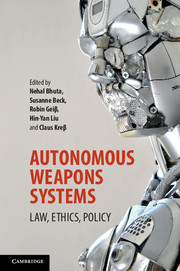
-
Select format
-
- Publisher:
- Cambridge University Press
- Publication date:
- 05 August 2016
- 19 August 2016
- ISBN:
- 9781316597873
- 9781107153561
- 9781316607657
- Dimensions:
- (228 x 152 mm)
- Weight & Pages:
- 0.72kg, 420 Pages
- Dimensions:
- (228 x 152 mm)
- Weight & Pages:
- 0.6kg, 420 Pages
You may already have access via personal or institutional login
Book description
The intense and polemical debate over the legality and morality of weapons systems to which human cognitive functions are delegated (up to and including the capacity to select targets and release weapons without further human intervention) addresses a phenomena which does not yet exist but which is widely claimed to be emergent. This groundbreaking collection combines contributions from roboticists, legal scholars, philosophers and sociologists of science in order to recast the debate in a manner that clarifies key areas and articulates questions for future research. The contributors develop insights with direct policy relevance, including who bears responsibility for autonomous weapons systems, whether they would violate fundamental ethical and legal norms, and how to regulate their development. It is essential reading for those concerned about this emerging phenomenon and its consequences for the future of humanity.
Contents
Metrics
Altmetric attention score
Full text views
Full text views help Loading metrics...
Loading metrics...
* Views captured on Cambridge Core between #date#. This data will be updated every 24 hours.
Usage data cannot currently be displayed.
Accessibility standard: Unknown
Why this information is here
This section outlines the accessibility features of this content - including support for screen readers, full keyboard navigation and high-contrast display options. This may not be relevant for you.
Accessibility Information
Accessibility compliance for the PDF of this book is currently unknown and may be updated in the future.


